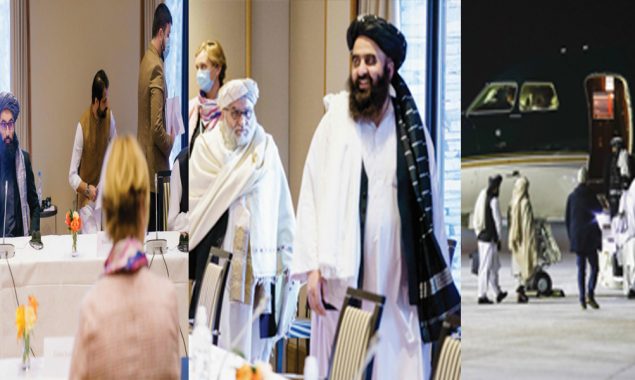Synopsis
Oslo talks hint at increased humanitarian assistance for Afghanistan

A Taliban delegation led by Islamic Emirate of Afghanistan’s (IEA) interim Minister for Foreign Affairs Mullah Amir Khan Muttaqi visited Norway, their first official visit to any European state after seizing power in Afghanistan five months ago, to participate in the three-day Oslo Talks on human rights.
The Taliban delegation reportedly met Norwegian officials and the representatives of allied nations including Britain, France, the European Union and the United States. Going into the talks, the Taliban’s main agenda was the unfreezing of its assets, recognition and the reopening of the embassies in Kabul.
“The Taliban hope of getting recognition by any European state before the US or others. However, that isn’t happening anytime soon as the world is concerned with the status of human rights, girls’ education, freedom of speech and Afghanistan’s political future, among other issues in the country,” analyst Mushtaq Yusufzai told Bol News.
Similar concerns were voiced by US Special Representative for Afghanistan Tom West and his European counterpart Tomas Niklasson on Twitter.
Referring to his participation in the Oslo meetings, Tom West wrote “I joined European colleagues for three days of important talks with Afghan civil society and Taliban leaders this week. Fair to say we were all blunt with each other re: our concerns”, while adding that “There must be a broad consultative process among Afghans on the country’s political future. Arbitrary detentions must end. Human rights must be protected. And a top priority must be unhindered access for women and girls to public schools countrywide at all levels.”
Similarly, replying to a tweet by Taliban spokesperson for the Ministry of Foreign Affairs Abdul Qahar Balkhi, European Special envoy for Afghanistan Tomas Niklasson wrote that he “also underlined the need for primary and secondary schools to be accessible for boys and girls throughout the country when the school year starts in March”.
The international community has been stressing unhindered access to school for all girls and women in the country. Although the Taliban have made some progress with their promises of allowing girls to school, they are facing immense challenges in paying salaries to the nearly 220,000 teachers across the country. “Teachers make up of more than 60 per cent of the civil servants in Afghanistan and since they work for the sanctioned Taliban government, they are unable to get assistance from the international donors,” Niaz Muhammad Khan, expert of Afghan affairs in Peshawar informed.
In the past weeks, the World Bank released some $280 million from the $1.5 billion Afghanistan Reconstruction Trust Fund for paying salaries of Afghan civil servants, including teachers. It is expected that another $400 million will be released soon.
For the Taliban delegation, their meeting with Norwegian humanitarian organisations went well as the organisations recognised the need for urgent humanitarian assistance. In a tweet, Taliban Abdul Qahar Balkhi mentioned the meeting between the Taliban delegation and officials of seven Norwegian charities to discuss the humanitarian situation in Afghanistan. “Officials of the charitable organisations promised cooperation in health, education, agriculture and livestock, demining and other humanitarian aid,” Balkhi tweeted, adding that Amir Khan Muttaqi, “termed the security situation in Afghanistan as a good opportunity and assured full cooperation in the delivery and distribution of aid.”
Like many donor countries, humanitarian organisations are concerned about getting hit by existing international sanctions on Afghanistan’s current rulers. “We cannot save lives unless all the sanctions are lifted. The freezing of the aid was hurting the same civilians that the North Atlantic Treaty Organisation countries spend hundreds of billions of dollars on defending until August [2021],” Norwegian Refugee Council Secretary-General Jan Egeland told media after participating in the Oslo Talks.
The humanitarian situation in Afghanistan continues to deteriorate rapidly as according to the United Nations (UN), 23 million or 55 per cent of the country’s population is threatened by famine. Similarly, UN relief coordinator Martin Griffiths was quoted by the media stating that “if we do not act immediately, 97 per cent of the population [in Afghanistan] will soon be living below the poverty line.”
In its biggest ever international appeal last week, the UN called for $4.5 billion for Afghanistan for 2022. Gulf countries like the Kingdom of Saudi Arabia, the United Arab Emirates and Qatar are eager to help while European nations are also worried about the dire needs of the Afghan people. The US has responded to the UN call with a donation of $308 million through independent humanitarian organisations. The former Taliban foe had already provided $474 million in humanitarian assistance to the Afghan people through USAID.
Although the Oslo Talks lacked in yielding any concrete results, the approach is seen as an ice-breaker between Europe and the Taliban, and it seems that the US is also encouraging such approaches as it wants to strengthen its relations with the Taliban through regular meetings and like the Organisation of Islamic Cooperation’s extraordinary conference in Islamabad and meetings in Doha. Meetings like the Oslo Talks will also help in achieving that goal.
Read More News On
Catch all the Breaking News Event and Latest News Updates on The BOL News
Download The BOL News App to get the Daily News Update & Follow us on Google News.



